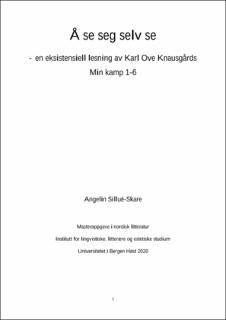Å se seg selv se
Master thesis

View/
Date
2020-12-17Metadata
Show full item recordCollections
- Master theses [274]
Abstract
Denne oppgaven analyserer Karl Ove Knausgårds Min kamp 1-6 i lys av eksistensialistiske og bevissthetsfilosofiske betraktninger, med utgangspunkt i Jean Paul Sartres teorier om væren i forhold til verden og andre mennesker. Fokuset er i hovedsak rettet mot fremstillingen av Karl Oves bevissthet, og undersøker hans forhold til seg selv, i lys av hans relasjon til andre mennesker, og da særlig hans far. Med utgangspunkt i romanens fortellerinstans, forsøker jeg å vise at Karl Ove har en utvikling gjennom de 6 bindene av Min kamp som skjer gjennom selve skrivingen av verket, fordi han ser seg selv se, samtidig som han blir sett av leseren, noe som kulminerer i en etisk fordring om «å feste blikket», som legges frem i sjette og siste bind av verket. Jeg argumenterer for at tematiseringen av bevissthetens forhold til seg selv, belyser en side ved den grunnleggende menneskelige væren, som ofte forsvinner for oss i det daglige, hvor vi i liten grad står i et avstandsforhold til våre egne selv. Jeg viser hvordan jeg forstår Karl Oves fordring om «å feste blikket» som knyttet til måten han ser seg selv og andre mennesker, og at den kan tolkes som en oppfordring til å forandre utkikkspunkt, noe som både skal gjøre livet meningsfylt, og forebygge vold. Til slutt påpeker jeg hvordan Karl Oves vektlegging av individets betydning i det sosiale, og hans insistering på at det aldri kan skje noen sosial forandring i fravær av den personlige, retter fokuset mot den enkeltes ansvar for samfunnet. Mine funn i arbeidet med denne oppgaven kan dessverre ikke løse verdens problemer, men jeg håper at den kan bidra til å kaste lys over grunnleggende eksistensielle vilkår, som er med på å forårsake dem, og at den fremhever noe av det som gjør Min kamp til en så viktig, og verdifull roman. This MA thesis analyses Karl Ove Knausgård’s Min kamp 1-6, through the lens of existential and consciousness-philosophical considerations, with Jean Paul Sartre’s thoughts on being in relation to the world and others as a starting point. My focus is on the representation of Karl Ove’s consciousness, and the thesis examines his relationship with himself, at different ages, in the light of his relation to other people, especially his father. After an examination of the narrator of the novel, I try to show how Karl Ove goes through an existential transformation through writing the six volumes of Min kamp, as a result of him seeing himself seeing, while at the same time being seen by the reader. My understanding is that this culminates in an ethical claim in the last volume of the novel: “å feste blikket”, which translates to “to fix one’s gaze”. I argue that through thematizing how consciousness relates to itself Knausgård shines a light on important aspects of the basic human being, which often are neglected in everyday life, where we rarely have the opportunity to observe our own thoughts from a distance. My thesis shows that the claim “to fix ones gaze” can be understood in relation to how humans see themselves and other people, and that it may be interpreted as an encouragement to change ones existential vantagepoint, which is supposed to both make life more meaningful, and to prevent acts of violence. In the end of my thesis I show how Karl Ove’s emphasis on the moral responsibility of the individual, and his insisting on that no social change is possible in the absence of a personal change, aims the focus on everyone’s responsibility in society. My findings may not be able to explain, nor change any of our world’s problems, but I hope that it can contribute to shine a light on some of the basic existential conditions that causes them, and that my thesis shows why Min kamp is such an important and extraordinary novel.